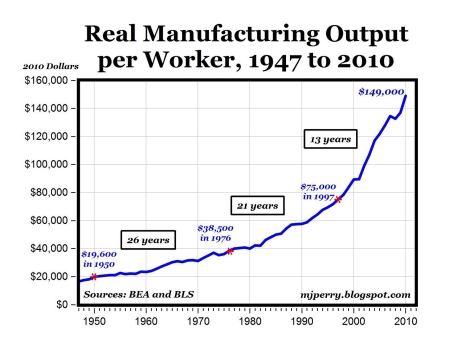Last year about a third of U.S. corporations with manufacturing in China told the Boston Consulting Group that they are bringing or plan to bring operations back to the United States.
The trend is called “re-shoring,” and all indications are that it is real. What’s driving it, according to an article in the Paris Tech Review, are falling U.S. energy costs due to hydrofracking for natural gas, closeness to world’s largest consumer market, a shorter supply chain and, especially, U.S. expertise in automation technology.
There’s the catch. Automation lowers the cost of U.S. labor compared to other countries, but it also eliminates jobs. Professor Tim Leunig of the London School of Economics estimated that if 10 percent of the Chinese electronics industry relocated to the United States, it would eliminate 300,000 Chinese jobs but only create 40,000 American jobs.
This doesn’t mean that re-shoring is of no benefit. It is of great benefit. The hollowing out of the U.S. manufacturing economy has reached a limit. Manufacturing jobs are increasing only modestly, but they are no longer declining.
The mere fact that more wealth is being generated in the United States should be of benefit for all American workers, whether they work for suppliers and subcontractors of the manufacturing companies, for providers of goods and services who benefit from a bigger consumer market, or for local governments that benefit from an increased tax base. But to the extent that the U.S. work force consists of temporary, part-time, low-wage workers, the wealth won’t be spread around.
Click on Reshoring, Really? to read the whole Paris Tech Review article.
Tags: Employment, Manufacturing Comeback, Manufacturing Jobs, Re-shoring, World Manufacturing



September 24, 2013 at 6:28 am |
[…] Re-shoring: the U.S. manufacturing comeback […]
LikeLike